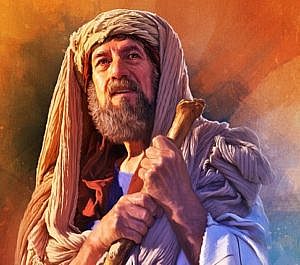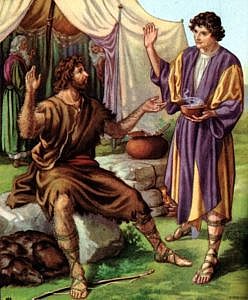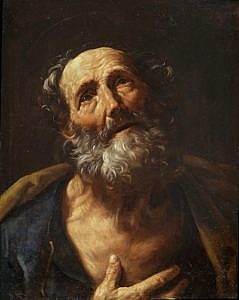Most of us have at least two personas; a public one we project and a private one we have to live with- or at least our spouses do. In my private practice I have observed how very different these two identities can be. Unless you are a narcissist, most are keenly aware of what we are not, and it can be crippling. Our inner demons mock us, reinforcing how disqualified we are from ever being of use to God. Ironically, in some cases religious leaders seem to agree with our demons! They use the bible to confirm our worst fears about ourselves. They want to shame us into good behavior. The pressure to be good enough is intense. The biblical record though presents a very different picture of who God seems to use and it is not who you would think. Let’s explore this…
It seems at first glance; God did not get Ambassador[i] Paul’s memo on who qualifies for his use. I say this in jest but for years I have heard church leaders quote this passage in I Timothy 3:1-7 as the standard of leadership for men God uses.
“It is a trustworthy statement: if any man aspires to the office of overseer, it is a fine work he desires to do. An overseer, then, must be above reproach, the husband of one wife, temperate, prudent, respectable, hospitable, able to teach, not addicted to wine or pugnacious, but gentle, peaceable, free from the love of money. He must be one who manages his own household well, keeping his children under control with all dignity (but if a man does not know how to manage his own household, how will he take care of the church of God?), and not a new convert, so that he will not become conceited and fall into the condemnation incurred by the devil. And he must have a good reputation with those outside the church, so that he will not fall into reproach and the snare of the devil.”
While these are all certainly noble qualities for each of us to aspire to, they were given in the context of church leadership which less than 1% of us will ever find ourselves in. So, what about the rest of us?
This passage has become so entrenched in the Christian community’s thinking, it has become the paradigm through which Christians evaluate whether someone is indeed an authentic servant of God. This includes determining whether God’s hand is on what they are doing. One of the unfortunate consequences of this narrow perspective, is we limit God to only working with finished products who possess impeccable character. That may work well for an experienced elderly man (Elder), but what about those who are younger and still being shaped? While I Timothy may be our way of evaluating whether something “is of God”, it seems God has very different ideas as to what He looks for in those He chooses to work with. Jesus would exemplify this perspective all through his life. Much to the chagrin of the religious leaders of his time, Jesus kept hanging out with the “wrong” people. He met with the Roman occupiers who were the Nazis of his time, even healing their children. In a modern American context; He carried on conversations with the girls from the local Pink Flamingo Strip Club and shared a drink with those detestable IRS agents oppressing their own people. He was setting free adulteresses, healing ungrateful lepers all the while turning religious paradigms on their head. He lived outside the traditional religious box and in doing so interacted with the wrong people, according to some. Other than a handful of folks, religious leaders never understood what He was doing and therefore never anticipated what was coming.
GOD USES A DIFFERENT LENS
This may come as a surprise to some of you, but God does not view the world or humanity in the same way you do. God doesn’t seem the least bit put off by people’s theology being wrong or their character being immature and flawed. He doesn’t stick to our model of waiting until someone is “ready” before He works in and through them! For those who work very hard at religious exercise in order to be qualified for service to God and be loved by him, this just drives them crazy. One can see this exemplified in the story Jesus told about the Prodigal Son and his elder brother with impeccable character. If we were to use the prefab paradigms handed down to us by our sub-culture leaders, most of the people God worked through would never have been our choices! We would have completely missed what God was doing. Let’s briefly look at four of them as an example.
ABRAM
 When one considers God’s choice of Abram to be the father of a nation of people through which He was going to reveal Himself to the rest of humanity, it’s an odd choice. Based on what we think we know about God and how we’ve been taught; he should have chosen Noah’s son Shem who was still alive at the time of Abram. Remember, it was Shem who worked side by side with his father all the way through the Ark Project. He was keenly aware of all the dynamics surrounding the tragic state of humanity and God’s plan to deliver his family from evil. After surviving the deluge, God would establish a covenant with Shem’s family (Genesis 9:8-10) giving them special status among humanity. He was the logical choice based on our handed down paradigms to lead God’s next project and yet that’s not what happened. Who did God decide to work through; a pagan Sumerian cattle herder from the city-state of Ur who worshiped Nanna the goddess of cattlemen. This goddesses’ temple was at the top of a large stepped pyramid called a ziggurat which means “mountain”. It was later rebuilt and enlarged by Babylonian king Nebuchadnezzar and can be visited today in southern Iraq. Yes, the father of the Jews is actually an ancient Iraqi by blood. Abram would find his life intersected by “El Shaddai” the God of the Mountain as he called Him and the trajectory of his life would change dramatically. Abram was, by our religious standards, ill equipped for the mission in front of him. He couldn’t keep his family alive in the land of promise God had sent him to. In an effort to survive, he headed south to Egypt where his cowardly character essentially resulted in his giving his wife to the king of Egypt for a dowry. The result; he became very wealthy. Once the whole ruse was discovered they kicked him out of Egypt, giving him more stuff and he became ridiculously wealthy. One of the “gifts” was an Egyptian slave girl named Hagar who would later make his life a living hell in a family squabble not all that different from ones we witnessed on the 1980’s TV drama “Dallas”. Abram even had his own J.R. Ewing in his nephew Lot who was greedy, ambitious and wanted to live the party lifestyle in Sodom. Despite the promises of being a father of a nation, Abram and Sarah had a fundamental problem; they couldn’t get pregnant. In an attempt to rectify the problem, they actually made it worse and the rest is history. Through all the drama, dysfunction and failure, Abram became a broken but changed man. God saw the long game and along the way Abram was transformed into Abraham.
When one considers God’s choice of Abram to be the father of a nation of people through which He was going to reveal Himself to the rest of humanity, it’s an odd choice. Based on what we think we know about God and how we’ve been taught; he should have chosen Noah’s son Shem who was still alive at the time of Abram. Remember, it was Shem who worked side by side with his father all the way through the Ark Project. He was keenly aware of all the dynamics surrounding the tragic state of humanity and God’s plan to deliver his family from evil. After surviving the deluge, God would establish a covenant with Shem’s family (Genesis 9:8-10) giving them special status among humanity. He was the logical choice based on our handed down paradigms to lead God’s next project and yet that’s not what happened. Who did God decide to work through; a pagan Sumerian cattle herder from the city-state of Ur who worshiped Nanna the goddess of cattlemen. This goddesses’ temple was at the top of a large stepped pyramid called a ziggurat which means “mountain”. It was later rebuilt and enlarged by Babylonian king Nebuchadnezzar and can be visited today in southern Iraq. Yes, the father of the Jews is actually an ancient Iraqi by blood. Abram would find his life intersected by “El Shaddai” the God of the Mountain as he called Him and the trajectory of his life would change dramatically. Abram was, by our religious standards, ill equipped for the mission in front of him. He couldn’t keep his family alive in the land of promise God had sent him to. In an effort to survive, he headed south to Egypt where his cowardly character essentially resulted in his giving his wife to the king of Egypt for a dowry. The result; he became very wealthy. Once the whole ruse was discovered they kicked him out of Egypt, giving him more stuff and he became ridiculously wealthy. One of the “gifts” was an Egyptian slave girl named Hagar who would later make his life a living hell in a family squabble not all that different from ones we witnessed on the 1980’s TV drama “Dallas”. Abram even had his own J.R. Ewing in his nephew Lot who was greedy, ambitious and wanted to live the party lifestyle in Sodom. Despite the promises of being a father of a nation, Abram and Sarah had a fundamental problem; they couldn’t get pregnant. In an attempt to rectify the problem, they actually made it worse and the rest is history. Through all the drama, dysfunction and failure, Abram became a broken but changed man. God saw the long game and along the way Abram was transformed into Abraham.
JACOB
 Abraham’s grandson Jacob, was also an unlikely character for God to work with and through. Though a fraternal twin with his brother Esau, by virtue of his coming out of the womb second, he was considered the younger brother. Jacob started out in life with a serious disadvantage. Not only was Esau his father Isaac’s favorite, he was also the one who would inherit the firstborn birthright whereby the family’s wealth would come under his management at the passing of his father. Jacob didn’t stand a chance measuring up to Esau’s physical attributes, Esau was a stud! He was a man’s man shopping at Bass Pro while lining his tent with hunting trophies. Esau would have been the star quarterback on the football team with girls hanging off of both arms. Autograph seekers would have stood in line for hours and corporations offered millions in endorsement deals. Esau would have been the guy invited to speak at conferences and interviewed on TV. He was that bright shining star who is the center of attention the minute he walked into a room. He turned heads.
Abraham’s grandson Jacob, was also an unlikely character for God to work with and through. Though a fraternal twin with his brother Esau, by virtue of his coming out of the womb second, he was considered the younger brother. Jacob started out in life with a serious disadvantage. Not only was Esau his father Isaac’s favorite, he was also the one who would inherit the firstborn birthright whereby the family’s wealth would come under his management at the passing of his father. Jacob didn’t stand a chance measuring up to Esau’s physical attributes, Esau was a stud! He was a man’s man shopping at Bass Pro while lining his tent with hunting trophies. Esau would have been the star quarterback on the football team with girls hanging off of both arms. Autograph seekers would have stood in line for hours and corporations offered millions in endorsement deals. Esau would have been the guy invited to speak at conferences and interviewed on TV. He was that bright shining star who is the center of attention the minute he walked into a room. He turned heads.
Jacob was the mommy’s boy book worm who found himself lost in his brother’s shadow. He was a geek with little manly hair and body better made for chess. How could he compete? Certainly not directly. Given the family dynamics and his physical limitations, Jacob couldn’t very well tackle most issues head on. The result was that he became a master manipulator playing mind games with his father, brother and uncle Laban while deceiving them all. In the process he strategically built up is assets through mergers and acquisitions. While his brother cared little for the finer things in life, Jacob surrounded himself with wealth. Based on everything we’ve been taught, Jacob’s character disqualifies him from ever being a vessel God would work through and yet God did. God saw something in His broken wannabe soul which no one else did. What God saw was worth his time to wrestle with him in a transformational moment. Once it was over he was a changed man who would walk the rest of his life with a limp and a new name. He was no longer Jacob “the supplanter” stealing from others but Israel, the one who “triumphs with God” and the father through which the twelve tribes of Israel would come into existence.
SIMON
 I can hear some of you say “well that was the Old Testament before the advent of the Holy Spirit”. When a man accepts Jesus as his Lord and Savior it instantly transforms him”. As one saved from edge of personal disaster and transformed by the afore mentioned Holy Spirit, I can testify to the fact just like the men of old, it’s a process. Case in point, let’s take Simon the Jewish fisherman from the Galilee region who would later become one of Jesus’ key students. As we know Simon was brash, outspoken and never one to shy away from a good conflict. He was ready to fight the Roman soldiers and Temple police when they came to arrest Jesus. Simon was passionate about everything. The death of Jesus was a devastating blow and the resurrection of Jesus a glorious surprise. There was some confusion as to what to do next so the small group of Messiah followers huddled together in Jerusalem while continuing to pray at the temple for guidance. They were waiting for a sign which appeared in force during the Jewish festival of Pentecost. Simon was so empowered that he boldly stepped forward and started to proclaim a Good News message as to who Jesus really was and what his teachings meant for the Jewish community. It was so powerful approximately 3,000 people decided to join their Jewish sect that day.
I can hear some of you say “well that was the Old Testament before the advent of the Holy Spirit”. When a man accepts Jesus as his Lord and Savior it instantly transforms him”. As one saved from edge of personal disaster and transformed by the afore mentioned Holy Spirit, I can testify to the fact just like the men of old, it’s a process. Case in point, let’s take Simon the Jewish fisherman from the Galilee region who would later become one of Jesus’ key students. As we know Simon was brash, outspoken and never one to shy away from a good conflict. He was ready to fight the Roman soldiers and Temple police when they came to arrest Jesus. Simon was passionate about everything. The death of Jesus was a devastating blow and the resurrection of Jesus a glorious surprise. There was some confusion as to what to do next so the small group of Messiah followers huddled together in Jerusalem while continuing to pray at the temple for guidance. They were waiting for a sign which appeared in force during the Jewish festival of Pentecost. Simon was so empowered that he boldly stepped forward and started to proclaim a Good News message as to who Jesus really was and what his teachings meant for the Jewish community. It was so powerful approximately 3,000 people decided to join their Jewish sect that day.
One might imagine that God chose a mature man ready for the moment with a righteous and generous heart to give that message. Well maybe not so much. You see, despite the Holy Spirit falling on Simon and his extraordinary moment, underneath in his heart he was still a racist. It was Simon’s perspective what God was doing was an exclusively Jewish thing. Simon had been raised in a sub-culture which had taught Him that Jews were special and holy. His worldview was that everything and everyone else outside of Jewish culture was unclean and unholy. It was a perspective which he would wrestle with for most of his life.
Simon’s paradigm was not God’s and it would take another extraordinary event in Simon’s life to get him to change. For all practical purposes God would slap him upside the head and tell him to wake up! How He did that is recounted in Acts 10. Living in the Roman capital of the region, Caesarea, was a Roman officer by the name of Cornelius. From the Jewish perspective he was a pagan but according to the biblical record he loved God and was a generous man. Much to the shock of the religious Jews, God spoke to this pagan and he was directed to contact Simon. Here’s where the problems continue; Simon received a vision from God which completely turned his sub-culture paradigm upside down. It turned out that God loved Gentiles too! Simon had to have been in shock and his mind reeling. “This can’t be” his mind would have screamed. To emphasize how serious he was about his point, God gave Simon the same vision three times!!! God knew full well Simon had a racist paradigm when he called him. He was a product of his culture. God also saw something else in him, a teachable heart. Simon which means “reed like” was transformed over time to Peter “the rock” upon which a great deal was built.
SAUL
 God was on a mission to see the Good News message reach the rest of the world. It was a monumental task and one which needed the right person. The logical choice would have been one of his loyal students who had traversed Israel with Jesus for three years. So who did God choose? He picked a raving religious zealot who was on a personal mission to completely wipe out the burgeoning Christian community. God picked the very guy who set out to destroy what he was building! It seems illogical. Saul of Tarsus (located in modern day Turkey) was a man intent on committing religious genocide. In some regard, choosing Saul to be the messenger to the Gentiles was the modern equivalent of him choosing and reforming Henrich Himmler the notorious Nazi responsible for the extermination of Jews during WWII. It’s hard to imagine!
God was on a mission to see the Good News message reach the rest of the world. It was a monumental task and one which needed the right person. The logical choice would have been one of his loyal students who had traversed Israel with Jesus for three years. So who did God choose? He picked a raving religious zealot who was on a personal mission to completely wipe out the burgeoning Christian community. God picked the very guy who set out to destroy what he was building! It seems illogical. Saul of Tarsus (located in modern day Turkey) was a man intent on committing religious genocide. In some regard, choosing Saul to be the messenger to the Gentiles was the modern equivalent of him choosing and reforming Henrich Himmler the notorious Nazi responsible for the extermination of Jews during WWII. It’s hard to imagine!
The young Christian community was so befuddled by the choice, when Saul tried to explain his Damascus Road experience of God appearing to him, virtually no one believed him. He would have to go off the grid for years and remerge later a changed man. Despite the transformation he had been through the cloud of suspicion would hang over his head for most of his life. He was persona non grata in many places. To make matters worse, his paradigm was radically different from the Jewish Christian community in Jerusalem. Despite his strict Pharisaical religious training, he would challenge the validly of Christianity being strictly a Jewish sect. For some he was considered a heretic and his integration of the Christian community with Gentiles seen as unholy. Paul saw God’s heart for the whole of humanity. He understood the teachings of Jesus were not only personally transformational but culturally as well. Saul of Tarsus, the arrogant young man became Paul which in Greek means “humble”.
I know there are many who struggle due to religious paradigms handed down. They disqualify themselves due to their perceived unworthiness. Just like Jesus did, God’s focus is on a person’s heart. He sees what others don’t. He’s more interested in what you want to be than who you are or have been. In light of this, it also behooves us to be slow to speak and judge in regard to who we think God may be working through. Being “good enough” has never been a requirement with God.
[i] The word “apostle” comes from the Greek word apóstolos, formed from the prefix (apó-, “from”) and root (stéllō, “I send”, “I depart”) and originally meaning “messenger, envoy, ambassador”. It has, however, a stronger sense than the word messenger, and is closer to a “delegate”.






Bob, I couldn’t agree more. Interesting how over time, God reveals and breaks down cultural barriers in our minds setting us free to walk through life as he intended.
It seems we are the ones who put boundaries on him. Often it is the disillusioning experiences we go through which open our eyes to unexpected possibilities.
I like this. Powerful. “Our inner demons mock us reinforcing how disqualified we are from ever being of use to God. Ironically, in some cases religious leaders seem to agree with our demons!”
Its ironic. I for one am glad God does see us like we see ourselves!
Thanks Bob!
I’m glad it was encouraging to you
The most interesting book on earth, the Bible. All we need do is open and read . . . Thanks for sharing!!
Yes, read it for ourselves without others telling us what we are supposed to see!
Dear Bob
from your posting I found that Jesus called his disciples from various steams. For example Simon, a racist, Saul known religious genocide , Mathew a cruel tax collector etc.. Alll of them called for a mission of his discretion. In our days we as professionals with different characters are also called to take forward his mission.. I realize that basically I as a teacher I was called with a purpose and I must do to fulfill his intention.
.
That’s an excellent perspective to have.
Hi Bob
A great article that is so encouraging for an old farmer like me without much education. Longing for you to come and help us in Zimbabwe to see the hope we have in our national weakness and foolishness, and in the Lord’s wisdom and strength.
I have so much respect for you Brian and remain hopeful I will one day be able to to return to Zimbabwe. In the mean time, its my hope these blogs will be helpful in shifting the way we look at things and open our eyes to new possibilities.
We are a diversity of the beloved of God. The “one” matters. God is especially fond of each one,and every one designed to serve the other, and where truly there is no “other.”. Good one Bob!
The lest of us matter!